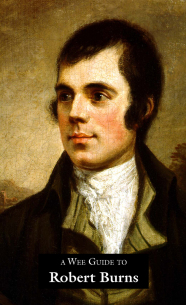Robert Burns 1791-96: The Gauger
My poetry will outlast my poverty
As with every enterprise in his life, Burns gave himself to his work with the Excise with vigour and diligence. Although one can find quotations in which he describes this task as ‘execrable office of whipper-in to the bloodhounds of justice’ it’s as well to remember that Burns was something of a chameleon in his mood swings, capable of expressing extremes of opinion in different letters to different people on the same day. Influential friends may have won him the Excise job, but his own competence kept it.
The evidence is that he was as careful and workmanlike in stamping leather and measuring malt vats as he was in writing poems. The Excise tax was hated and times were hard: smuggling and illicit stills were but two ways to circumvent it. The job of an Exciseman carried risk and sometimes violence. Like his brother officers, Burns was armed: his brace of pistols may be seen today in his Birthplace Museum. Shortly before his death, Burns gave them to his Dumfries doctor, William Maxwell. This Dr Maxwell was not only his doctor but his friend, and had led a colourful life. A native Scot educated in France, where he studied medicine, he had been one of the National Guard present at the execution of Louis XVI.
In 1792, Burns was promoted to the First or Port Division of the Dumfries Excise. His patch could now be covered on foot, and his pay was £70 a year with the possibility of up to £20 extra in bonuses.
The Edinburgh Evening Courant of 8 March that year carried news of an exciting raid in the Solway Firth, which had taken place a week earlier. A smuggling brig Rosamond was stranded by the tide in the Firth, and Burns, at the head of a party of armed dragoons, attempted to board her. It being too dangerous to commit horses to the treacherous sands, he led his men chest-deep into the freezing waters. They were continuously under fire from the smugglers, until – with the Excise 100 yards from the vessel – they gave up and legged it over the side and for England.
The contents of the Rosamond went to public auction, and Burns bought four carronades – small cannon – which he then donated to the French Legislative Assembly. It was a cavalier gesture of solidarity with a revolutionary cause – quite apart from the fact that they cost a great deal of money which he could not afford.
These were the closing years of his life: both physically and mentally, he was often in great distress. But Burns was a man of mercurial spirits. Whatever his private anguish – and his capacity for it was considerable – he was a man engaged with life and the business of life. Playing with his children or talking with company in the pubs of Dumfries – the Globe Inn or the King’s Head – he soon regained that graceful warmth which drew people to him.
Part of this commitment to life was Burns’ passion for politics. All his life he would champion egalitarianism and justice in society, and thus any cause he saw as representing these principles. It was this passion that enabled him to embrace quite opposing principles without thinking things through: he could be both a Jacobite and anti-royalist, as he was in his support of the French Revolution. In later generations, workers’ movements would claim Burns for their own. Keir Hardie, founder of the British Labour movement, wrote that he ‘owed more to Burns than to any man, living or dead’.
Revolution was the backdrop to Burns’ life. He was 17 when the American War of Independence started in 1776, and an ardent supporter of the American cause. As a Jacobite, he had no loyalty to the German dynasty in London. Moreover, two of the heroes of that revolution – Benjamin Franklin and George Washington – were Freemasons. Once again, it seemed that Freemasonry was the natural intellectual home of all right-thinking men who championed equality and freedom.
During his career as an Exciseman, and therefore a hired hand of the government, Burns was often in hot water because of his radical political views. On more than one occasion he was forced to retract or apologise for something said or written when faced with the threat of losing that desperately needed income. There is a theory that some of the more radical poems he wrote in these Dumfries years were destroyed at his death by well-meaning friends, anxious not to jeopardize Jean’s future financial security as the widow of an Exciseman.
One example of this recklessness on the part of a civil servant came at a large gathering of establishment figures when a toast was proposed to the Prime Minister Pitt. Burns suggested they raise their glasses instead to ‘the health of a better man, George Washington’.
In October 1792, after a performance of As You Like It at the Theatre Royal in Dumfries, a group of radicals began to sing the French revolutionary song Ça Ira – and Burns joined in. Denounced as disloyal, another apology followed, and more bile was swallowed only in the interests of his family’s income.
In Dumfries, Burns became involved in local politics to the extent of writing ballads supporting the local Tory candidate against the Whig candidate sponsored by the Duke of Queensberry – although he later changed and became a Whig supporter. In the Duke, Burns saw the archetype of the wicked aristocrat: self-indulgent and opulent in lifestyle, and a bad landlord. Aristocrats such as the Duke were having a bad time in France, and Burns watched events in that country with delight.
In 1789 the Bastille was stormed and in 1793 Louis XVI and Marie Antoinette went to the guillotine. Burns wrote of the latter event: ‘What is there in the delivering over of a perjured Blockhead and an unprincipled prostitute into the hands of the hangman ...’ It is an uncharacteristically bloodthirsty comment for a man who was so resolutely anti-war and hated violence.
‘War,’ he once said, ‘I deprecate: misery and ruin to thousands are in the blast that announces the destructive demon.’ And, with a typically light reference to a favoured pastime, ‘I am better pleased to make one more than be the death of 20.’
In 1791, Burns met another educated, socially superior woman with whom he conducted a platonic though ardent friendship. Maria Riddell was English, born in 1772 and thus 13 years Burns’ junior, and the daughter of the Governor of the Leeward Islands. In 1790 she had married Walter Riddell who owned sugar plantations in the West Indies, and in 1792 they moved to Scotland with their two daughters, buying an estate they renamed Woodley Park – Woodley was Maria’s maiden name – near Dumfries.
Like other cultured ladies of taste and education, Maria wrote poetry and imagined herself artistic – she had after all published a book about the Leeward Islands. Her brother-in-law Robert Riddell owned Friar’s Carse, an estate north of the Burns farm at Ellisland, and Burns was a frequent visitor. The two men had music as a common bond. Here, in 1791, Maria and Robert met; by April 1793 she was ‘thou first of Friends’. Sending her the poem ‘The last time I came o’er the moor’ Burns comments revealingly: ‘It is but a cold, inanimate composition. It will be absolutely necessary for me to get in love, else I shall never be able to make a line worth reading on the subject.’
They met frequently until an incident at Friar’s Carse led to an estrangement. Various accounts are given of this incident, at which Maria was not present, but it involved a drunken Burns and ‘inappropriate’ behaviour towards Robert Riddell’s frosty English wife. Although this incident is sometimes called ‘The Rape of the Sabine Women’ it sounds no more than the boisterous rowdiness that may accompany a robust consumption of drink – but Burns’ English hosts were not amused at all by this affront to upper-class manners. For a while Burns was not invited to Friar’s Carse and Maria felt obliged by family loyalty to cold-shoulder him. This caused Burns a great deal of torment: ‘In a face where I used to meet the kind complacency of friendly confidence, now to find cold neglect and contemptuous scorn – is a wrench that my heart can ill bear.’
By 1795 they were, however, reconciled. Maria was now living with her husband at Tinwald House, between Dumfries and Lochmaben – Woodley Park had been lost by his financial improvidence.
After Burns’ death, Maria proved a true friend to his memory. She wrote a generous memoir for the Dumfries Weekly Journal which was reprinted widely and alludes to his personal failings with the sensible comment: ‘the world must have continued very stationary in its intellectual acquirements, had it never given birth to any but men of plain sense.’ Maria died in 1808, 12 years after Burns, at the age of 36.
Burns established himself as a popular figure in Dumfries. His social circle was always wide and his Dumfries friends included a farrier as well as the Collector of Stamp Duties. From boyhood he was always willing to put his literary skills at the service of others, and here too he continued to compose letters for those who asked: letters of love, of pursuit or of business.
With the birth of a son James in 1794, he and Jean now had a family of four boys – Elizabeth, the only surviving daughter who was Rob’s particular treasure, had been born in 1793 and the family moved to a larger, geranium-brick house in Mill Vennel, now called Burns Street. There were two rooms upstairs, and the room he shared with Jean had a box-bed similar to the one he’d been born in, with a cradle on the floor beside it, scarcely ever empty. Off this room was a tiny study for writing, in which he scratched his name on the window.
The big family Bible – now in the Museum – contains details of the births of all their children written in Rob’s big distinctive hand – all except the birth of Maxwell, the son born on the day of his funeral and named in honour of his doctor.
Family life absorbed him. He enjoyed the time spent directing the education of his boys. As for Jean, he was anxious that his wife should be well-dressed – she who was so occupied with children and a household. She was one of the first women in Dumfries to follow that elegant new trend and wear a gingham dress.
The start of the war with France in 1793 affected the Excise business and his income dropped. Burns’ health suffered accordingly. He described his affliction by the ‘terrible trinity – Rheumatism, Cold and Fever’.
His political sympathies again caused him distress in this year of 1793. In August Thomas Muir of Huntershill, Glasgow, a lawyer of liberal sympathies, was brought to trial. His crime was sedition: the jury found him guilty as charged, of distributing copies of Thomas Paine’s The Rights of Man, a banned book. Among other things, Paine inveighed against the tradition of inherited wealth and status in France and in Britain. Burns himself owned a copy and had read it with profound admiration. Muir was sentenced to 14 years’ transportation, a severe sentence that was meant to shock and to warn.
There is evidence that Burns felt duly shocked and warned – deeply depressed by the values of the society in which he lived, but to whom he owed his meat and drink. Burns and his friend John Syme were in Gatehouse of Fleet when Muir was led through in chains, on his way to a show trial in Edinburgh.
A direct result of Thomas Muir’s sentence was the song ‘Scots wha’ hae wi’ Wallace bled’. From boyhood, Burns had had a fascination for William Wallace, the thirteenth-century hero of Scottish independence. He later wrote: ‘The story of Wallace poured a Scottish prejudice in my veins which will boil along there till the flood-gates of life shut in eternal rest.’ Forbidden in 1793 from paying open tribute to Muir, Burns looked back to another man who had paid dearly for standing up before tyranny.
His bitterness at being unable to express his personal views as publicly as he would wish led to the composition of these telling lines:
In Politics if thou would’st mix
And mean thy fortunes be;
Bear this in mind, be deaf and blind,
Let great folks hear and see.
The literary task which continued to occupy most of Rob’s time was his collaboration with James Johnson, a music publisher, and George Thomson, an Edinburgh civil servant and gifted musician, on the Scots Musical Museum. His friend Robert Riddell was a more than competent musician, and Rob learned immensely from him, eventually outstripping both his collaborators with his musical polish and style. In a letter of 1793 Burns described the essence of a ballad as being simplicity, but he himself took great pains with even the simplest of lyrics, knowing how hard true simplicity is to achieve. ‘Auld Lang Syne’ was first published in one of these volumes.
The war with France dragged on, and in 1795 Burns joined the Royal Dumfries Volunteers, a democratically run militia. There was a splendid uniform with a red braided jacket and white breeches, but the tailor’s bill for £7 4s threw Burns into a frenzy of despair. As always, he vented his fury in verse:
What ails ye now, ye lousie bitch,
To thresh my back at sic a pitch?
The final years are clouded by money worries. Stepping into another man’s shoes as a district supervisor carried with it the burden of additional work and responsibility, which he discharged with competence and efficiency, despite mounting debts. Toothache added to his wretchedness, although he immortalised that particular pain in verse too, and the giggles of his children at his discomfort:
A’ down my beard the slavers trickle,
I throw the wee stools o’er the mickle,
While round the fire the giglets keckle,
To see me loup,
An’, raving mad, I wish a heckle
Were I’ their doup!
Where’er that place be priests ca’ hell,
Where a’ the tones of misery yell,
An ranked plagues their numbers tell,
In dreadfu’ raw,
Thou, toothache, surely bear’st the bell,
Among them a’!
Burns was not alone in his worries about money and providing for his family. Others fared even worse: 1796 saw the Meal Riots in Dumfries over a shortage of food after a poor harvest.
In September 1795 his favourite child, three-year-old Elizabeth, died. Rob and Jean had sent her to Mauchline, in the hope that a change of air would restore her: the demands of Excise work meant he could not even travel north to attend her funeral, and for two months he wrote nothing. Grief made him ill, possibly with rheumatic fever, though Dr Maxwell made a diagnosis of what he called ‘flying gout’.
In his dying months, Jean was again pregnant. A young woman named Jessy Lewars came into the household to help with the nursing, and for the last time in his life, Burns fell romantically in love, scribbling notes to her on a glass tumbler since he could not reach the window. For her, he wrote ‘O wert thou in the cold blast’.
Or were I in the wildest waste,
So black and bare, so black and bare,
The desert were a Paradise,
If thou wert there; if thou wert there.
By the summer of 1796 Burns’ physical condition was so poor – racked with pain and dosed with mercury – that even a doctor might see the man was desperately ill. Eighteenth-century medicine being what it was, the ‘cure’ for an illness rheumatic in nature was deemed to be the waters of the Solway Firth, and this is what Dr Maxwell recommended. Jean, Jessy and Rob thus decamped for Brow on Solway on 3 July and once again, this time to save his life, the poet sank up to his armpits in those chilly waters, which no summer sun has ever warmed.
By chance, Maria Riddell had also been ill and was recuperating nearby. They arranged to meet. ‘I was struck with his appearance on entering the room. The stamp of death was imprinted on his features. He seemed already touching the brink of eternity. His first salutation was “Well, madam, have you any commands for the other world?”’
At that meeting, Burns expressed concern for his reputation after his death: he was certainly aware that his death would create some reaction and that every piece of his writing might be used against him to damage his future reputation: that letters and verses he had written with unguarded and improper freedom, and which he hoped would be ignored, would be handed about and discussed.
He returned to Dumfries unrestored, scarcely able to walk the few steps from his carriage to his front door. Seeing a fellow member of the Royal Dumfries Volunteers, he joked: ‘John, don’t let the Awkward Squad fire over me’. He took to his bed in the upstairs room, and died on 21 July at five in the morning. He was 37 years old.
The funeral took place on 25 July, and on the same day Jean gave birth to their ninth child. Because of Burns’ militia connections, he was given a military funeral. Two regiments escorted the coffin, as well as Burns’ beloved Volunteers, and the body was laid to rest in St Michael’s Kirkyard, Dumfries.
The Dead March from Saul accompanied the cortege, and the Awkward Squad did indeed fire a volley over the coffin. 21 years later, on 19 September 1817, the coffin was moved to its present resting place in the Mausoleum.
Members of his family are buried with him, including Jean, who survived him by 38 years, and now lies forever by his side.
© Martin Coventry & Dilys Jones 2017









